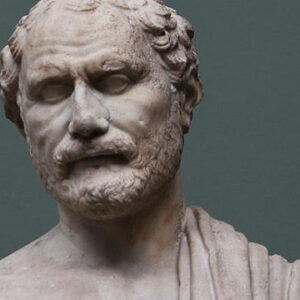Demosthenes was a pivotal person in ancient Greek history. He is credited with significantly contributing to the development of rhetoric and oration in ancient Athens as a distinguished orator and statesman of his time. Orphaned at a young age, he was brought up by his guardians, who benefited from his father’s huge estate. Despite his education, he was unable to communicate effectively due to a speech impairment. He overcame this handicap, though, and became a superb orator. He utilized his oratory skills to wrest back a piece of his fortune from his guardians. Along with his oratory abilities, he was an accomplished writer who frequently wrote speeches for clients interested in legal proceedings. A guy of exceptional brilliance, he was capable of handling a wide variety of situations, earning him several wealthy and powerful clients. His experience in the judiciary qualified him to run for office as well. He is well remembered for his orations intended against Macedonian King Philip II, who was legally at war with Athens. He delivered numerous forceful statements as Athens’ envoy opposing Macedonia’s advance into Athens. Demosthenes strove to defend his city against Macedon’s onslaught and to maintain Athens’ independence.
Childhood & Adolescence
In 384 BC, Demosthenes was born. Demosthenes’ father, also named Demosthenes, was a prosperous swordsmith from the nearby tribe of Pandionis.
He was orphaned when he was seven years old. His father had given him a sizable legacy, but his legal guardians misappropriated the money.
As a child, he struggled with a speech impediment and had to work extra hard to overcome it.
When he was twenty years old, he sued his guardians for his inheritance but was only able to obtain a part of what his father truly left him.
While defending his legal rights, he began honing his oratory talents in order to more successfully defend himself. He gave five orations against his guardians between 364 and 361 BC.
He received training to hone his oratory skills. His training is described differently by different historians, but it is universally recognized that he was trained by Isaeus.
Demosthenes Career
Demosthenes began his career as a logographer around 361 BC, writing speeches for persons interested in legal proceedings. He was capable of handling any type of issue and had a large number of influential customers. His legal practice laid the groundwork for a later political career.
In 363 and 359 BC, he served as a trierarch. A trierarch was an officer responsible for the command of a trireme, or ship.
From 355 to 541 BC, he continued to practice law. He also delivered remarks in opposition to those who sought to eliminate tax breaks. His lectures were anti-corruption and targeted individuals accused of unlawful activity.
In 354 BC, he delivered his first political oration, ‘On the Navy.’ He recommended changing boards in order to fund the Athenian navy in this speech.
He delivered the speech ‘For the Megalopolitans’ in 352 BC, followed by the speech ‘On the Liberty of the Rhodians’ in 351 BC. In both of these lectures, he took on Eubulus, the most powerful Athenian statesman.
Since 357 BC, Athens had been at war with Macedonia. Philip of Macedon had already conquered Amphipolis and Pydna and was attempting to take Athens. Demosthenes considered the King a threat to the independence of all Greek cities and addressed him in a series of speeches.
In 351 BC, he delivered the First Philippic, in which he exhorted the Athenians to be prepared for war and argued for the establishment of a flexible military force capable of combating Philip’s army.
In 349 BC, Philip II attacked Olynthus. Athens and Olynthus were allies, and he pushed Athens to assist Olynthus in 349 BC with three speeches dubbed the ‘Olynthiacs.’
Demosthenes traveled to Peloponnese in an attempt to free specific cities from Macedon’s hegemony but was unsuccessful. In 344 BC, he delivered the Second Philippic as a harsh attack on Philip.
In 341 BC, he gave the Third and Fourth Philippics.
In 336 BC, Philip II was assassinated, and Alexander III was crowned King of Macedon. Demosthenes and his fellow Athenians commemorated Philip II’s death.
His Significant Works
Demosthenes is widely recognized as the greatest orator in ancient Greek history, best known for his speeches against King Philip II of Macedon, Athens’ greatest adversary. He used four of these speeches, dubbed the four Philippics, in his attacks on the king.
Personal History and Legacies
He married Heliodorus’s daughter, a famous Athenian citizen. His wife’s name is unknown. He had one daughter, who died unmarried and young.
Following Alexander’s death in 323 BC, the new ruler sought the handover of Demosthenes. Demosthenes was sentenced to death but managed to flee to Kalaureia’s sanctuary. He was quickly apprehended, and he committed suicide by ingesting poison to evade capture.
Years after his death, the Athenians constructed a statue in his honor and commanded that his descendants be fed with free meals at the Prytaneum.
Estimated Net worth
Unknown.


